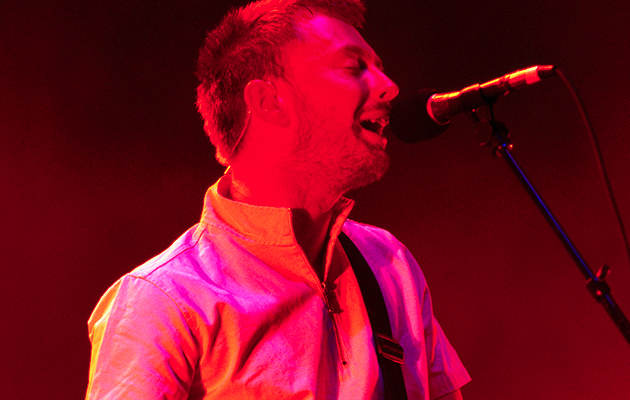Another spur behind the creative left turn of Kid A was doubtless the new crop of emotionally charged guitar bands cruising in Radiohead’s wake, their corporate paymasters hoping to bathe in reflected glory. Just as Travis, Muse, Coldplay and their peers seemed to consolidate this A&R trend, the original Radiohead wisely set their controls for galaxies new.
“Everybody’s got to start somewhere,” offers Yorke diplomatically, but his tone is one of thinly veiled contempt. “Just like we were ripping off the Pixies when we started, or trying to and failing. But at the same time, the one thing that does my head in about it in this country is that Radio 1 will willingly play that lot and won’t touch us with a bargepole – that sort of makes me spit blood. It’s all about supply and demand and as, of course, we’re not supplying that demand now, then someone else ought to.”
Radiohead stumbled through 1999 with recording sessions in Gloucestershire, Paris and Copenhagen, but progress was slow. “It’s taken us seven years to get this sort of freedom,” confessed O’Brien in his online diary at the band’s website, www.radiohead.com. “It’s what we always wanted, but it could be so easy to fuck it all up.”
After OK Computer, Yorke bought a new house overlooking a remote Dorset beach, and blasted his overheated brain with fresh air. “I got back into drawing,” says the man who left Exeter University with a 2:1 in English and Art. “Lots of drawing, and lots of walking. It was the best help I could get, really, especially in extreme weather and strong winds and things like that. It kind of reflects what’s going on inside.”
A thoroughly English cure. Never mind the self-medicating slackers of the Prozac Nation, we do things rather differently over here. Fresh air and solitude. A brisk walk, an improving book. Very Radiohead.
Yorke’s windswept comedown sessions also helped alchemise personal angst into political anger. The undercurrent of social protest which haunted OK Computer finally crystallised into serious social activism, and Yorke became a spokesman for the Jubilee 2000 campaign to drop Third World debt, finding a healthy outlet for his natural persecution mania in the growing anti-globalisation movement. If nothing else, he gained a sense of perspective. “Radiohead very much came out of the culture of complaint,” announced Yorke in 1999. “We’ve grown up now and it’s dawned on us that our problems are utterly, utterly irrelevant.”
Radiohead’s frontman had been on protest demos as far back as the late ’80s, but grew impatient with old political definitions. “I got involved with left-wing stuff when I was at university and it was just so boring, like comparing the size of your penis – how much redder am I than you? It’s just really dull, really macho. A waste of space, really. This to me has nothing to do with the politics that are being discussed. This is to do with the operations of people like the IMF who are responsible for the deaths of millions of people every year around the globe, who we have put into power, we finance, and we don’t know who they are, and they’re not answerable to us in any way, and yet they decide everything. This is a humanitarian issue.”
So it was a personal connection? “Yes, it was exactly that. I had to wait for it to become personal, which it did, really. And getting involved in things like Jubilee 2000 made it personal for me.”



